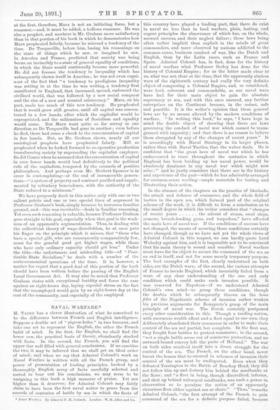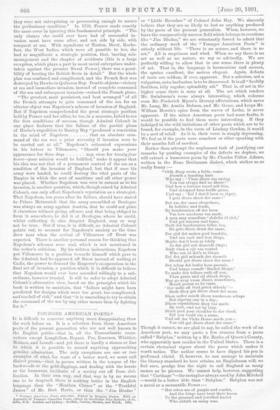NAVAL WARFARE.*
M. TAINE has a clever illustration of what he conceived to be the difference between French and English intelligence. Suppose a double set of " pigeon-holes " in two bureaux, and take one set to represent the English, the other the French habit of mind. In the first, the English, we shall find the lower row, the practical basis of theory, abundantly stocked with facts. In the second, the French, you will find the upper tier well filled with general conclusions. If we combine the two, it may be inferred that we shall get an ideal order of mind; and when we say. that Admiral Colomb's work on Naval Warfare is written with all the French grasp, and rower of presentation of leading principles, backed by a thoroughly English array of facts carefully selected and sorted to bear out his conclusions, we may seem to be assigning to this book a high measure of praise. Yet not 'higher than it deserves ; for Admiral Colomb may fairly claim to have been the first naval writer to prove from the records of centuries of battle by sea in which the fleets of
* Naval Warfai a By Admiral P. H. Colomb. London; W. H. Allen and Co.
this country have played a leading part, that there do exist in naval no less than in land warfare, plain, lasting, and cogent principles the observance of which has, on the whole, secured success, and their neglect failure; these laws being often rather implicit than explicit in the minds of great commanders, and more observed by nations addicted to the common-sense, business conduct of war, like the Dutch and English, than by the Latin races, such as France and Spain. Admiral Colomb has, in fact, done for the history of naval warfare what Professor Seeley has done for the history of Colonial Empire ; for as the latter made clear td us, what was not clear at the time, that the apparently aimless wars of the eighteenth century had really the very definite object of conquering a Colonial Empire, and, so considered, were both coherent and commendable, so our naval wars have had for their main object to gain the absolute supremacy at sea, and with this once assured, any further enterprises on the Continent became, in the outset, safe and possible. It is the writer's opinion that these general laws are by no means altered by the modern conditions of warfare. "In writing this book," he says, "I have kept in mind the double object of showing that there are laws governing the conduct of naval war which cannot be trans- gressed with impunity ; and that there is no reason to believe them abrogated by any of the changes of recent years." It is accordingly with Naval Strategy in its larger phases, rather than with Naval Tactics, that the writer deals. He is confident that "the great laws of naval war which he has endeavoured to trace throughout the centuries in which England has been buiding up her naval power, would be absolutely dominant in any naval war which might now arise ; " and he justly considers that there are in the history and experience of the past—which he has admirably arranged for common-sense reading—ample materials for testing and illustrating their action.
In the absence of the chapters on the practice of blockade, the attack and defence of commerce, and the whole field of tactics in the open sea, which formed part of the original scheme of the work, it is difficult to form a conclusion as to the small degree in which the writer considers that "changes
of recent years the advent of steam, steel ships, armour, breech-loading guns, and torpedoes," have affected the main laws of naval war. If the conditions of success have not changed, the means of securing those conditions certainly have changed, though as we have not yet the whole views of Admiral Colomb in this respect, we can hardly quote Lord Wolseley against him, and it is impossible not to be convinced that his main theory is sound and sensible. Naval warfare must have for its object to secure the command of the sea as an end in itself, and not for some merely temporary purpose. The best examples of the first, clearly understood on both sides, are the Dutch wars; of the second, the various attempts of France to invade England, which invariably failed from a want of any clear understanding of the one and only condition which could make such invasion possible. It was reserved for Napoleon—if we understand Admiral Colomb's own mind—to grasp these conditions, though the doubts which he subsequently throws on the bona fides of the Napoleonic scheme of invasion rather weaken his previous arguments for Bonaparte's grasp of the main principle of naval war. The Dutch certainly postponed every other consideration to this. Though a trading nation, with enormous wealth afloat and a fleet equal to our own, they deliberately abandoned their commerce in order to make their control of the sea not partial, but complete. In the first war, they fought four battles to protect commerce ; in the second, "not a single battle arose out of commerce protection, and no outward-bound convoy left the ports of Holland." The war on both sides resolved itself into a direct struggle for the control of the sea. The French, on the other hand, never learnt the lesson that to succeed in schemes of invasion their control of the sea must be undisputed. Even when they defeated Torrington in the Battle of Beachey Head, they did not follow him up and destroy him behind the sandbanks at the Nore ; and "a fleet in. being, though discredited, inferior, and shut up behind unbuoyed sandbanks, was such a power in observation as to paralyse the action of an apparently victorious fleet either against sea or shore," "Thus," remarks Admiral Colomb, "the first attempt of the French to gain command of the sea for a definite purpose failed, because
they were not enterprising or persevering enough to secure the preliminary condition." In 1759, France made exactly the same error in ignoring this fundamental principle. "The only chance she could ever have had of successful in- vasion must have come after, and not side by side, with conquest at sea. With squadrons at Toulon, Brest, Roche- fort, the West Indies, which were all possible to her, she had so magnificent a strategic position, that, barring mis- management and the chapter of accidents [this is a large exception, which plays a part in most naval enterprises under- taken against the premier Naval Power], there was a possi- bility of beating the British fleets in detail." But the whole plan was confused and complicated, and the French fleet was destroyed by Hawke in Quiberon Bay. Double objects—victory at sea and immediate invasion, instead of complete command of the sea and subsequent inVasion—ruined the French plans.
" The greatest, most persistent, and best arranged" of all the French attempts to gain command of the sea for an ulterior object was Napoleon's scheme of invasion of England, But if Napoleon comprehended the great strategic position held by France and her allies, he too, in a measure, failed to see the first conditions of success, though Admiral Colomb in one place declares that the failure of the partial plans of Hoche'a expedition to Bantry Bay "produced a conviction
in the mind of Napoleon that an absolute com- mand of the sea was a prior necessity if invasion were to be carried out at all." Napoleon's reiterated expressions in his letters to Villeneuve, "Should you make your appearance for three days nay, even for twenty-foar hours—your mission would be fulfilled," make it appear that his idea was not that of a permanent control of the sea as a condition of the invasion of England, but that if once his army were landed, he could destroy the vital parts of the Empire in which the seat of maritime and all other power was placed. Whether Napoleon was ever in earnest as to his invasion, is another question, which, though raised by Admiral Colomb, can only affect Napoleon's reputation as a strategist. That Napoleon, ten years after its failure, should have stated to Prince Metternich that the army assembled at Boulogne was always an army against Austria, that he could not place it elsewhere without giving offence, and that being obliged to form it somewhere, he did it at Boulogne, where he could, whilst collecting it, also disquiet England, may or may not be true. But if true, it is difficult, as Admiral Colomb points out, to account for Napoleon's anxiety as the time drew near when the arrival of Villeneuve off Brest was expected. There is another personal reason for thinking that Napoleon's schemes were real, which is not mentioned in the writer's criticism. By his written instructions, Napoleon put Villeneuve in a position towards himself which gave to the Admiral, had he appeared off Brest instead of waiting at Cadiz, the power to demand the Emperor's co-operation in the final act of invasion, a position which it is difficult to believe that Napoleon would ever have accorded willingly to a sub- ordinate, however trusted. It will be safer to adopt Admiral Colomb's alternative view, based on the principles which his book is written to maintain, that "failure might have been predicted for designs which were too great, too complicated, and too full of risk," and that it is unavailing to try to obtain the command of the sea by any other means than by fighting for it."



































 Previous page
Previous page